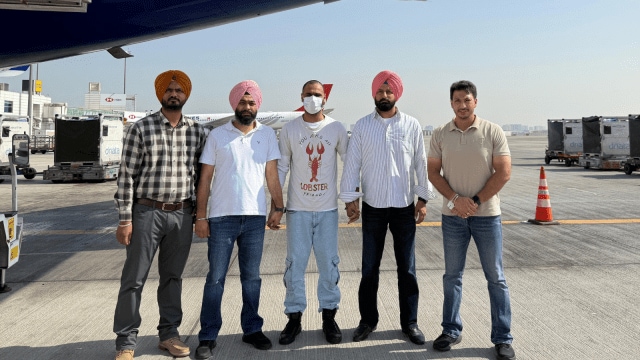In a significant breakthrough for Indian security agencies, a key operative of the banned Khalistani outfit Babbar Khalsa International (BKI) has been extradited from the United Arab Emirates (UAE) to India. Punjab Police formally took custody of the accused, marking a major success in New Delhi’s efforts to crack down on overseas terror networks linked to separatist violence.
The Extradition
The extradition was the result of close coordination between Indian investigative agencies, the Ministry of External Affairs, and authorities in the UAE. The accused had been living abroad for several years, allegedly using foreign soil to plan and finance activities aimed at destabilizing Punjab and reviving the Khalistan movement.
Officials confirmed that the terrorist was on the radar of Indian security agencies for his role in raising funds, coordinating with sleeper cells, and facilitating arms smuggling for Babbar Khalsa operatives. His presence in India is expected to aid ongoing investigations into cross-border terrorism and the recent surge in radical propaganda targeting youth in Punjab.
Punjab Police Take Custody
Once extradited, the terrorist was brought to India under tight security and handed over to Punjab Police. He is likely to face interrogation by specialized anti-terror units to uncover his networks, both in India and abroad. Authorities believe his custody could shed light on:
-
Financial pipelines sustaining Khalistani outfits from foreign territories.
-
Links with Pakistan’s ISI, which has historically supported such organizations.
-
Local operatives and sleeper cells that may have remained dormant awaiting instructions.
Significance of the Move
The extradition represents more than just the capture of one individual. It highlights India’s growing success in persuading foreign governments to act against separatist extremists who have sought refuge overseas.
For Punjab Police, grappling with sporadic incidents of targeted killings, arms recoveries, and radicalization through social media, the custody of such a high-value suspect is both a morale boost and a potential source of critical intelligence.
Babbar Khalsa: A Persistent Threat
Founded in the 1980s, Babbar Khalsa International has been one of the most violent Khalistani terror groups, responsible for several bombings, assassinations, and attempts to destabilize Punjab. Though its domestic network was largely dismantled in the 1990s, the outfit has continued to operate from abroad, particularly in Canada, the UK, and parts of Europe and the Middle East.
Indian agencies believe that such groups, though weakened, remain a threat because they tap into diaspora communities, exploit social media, and collaborate with other hostile actors to keep separatist sentiments alive.
Message to Extremist Networks
The extradition from the UAE sends a strong message: no safe haven will be permanent for those wanted in India on charges of terrorism. It also underlines the deepening cooperation between India and Gulf countries, where several Khalistani-linked operatives have sought to evade justice.
Conclusion
The handover of a Babbar Khalsa terrorist to Punjab Police marks a decisive step in India’s fight against separatist extremism. As investigations unfold, the case is likely to provide valuable insights into the shadowy networks that attempt to destabilize Punjab. More importantly, it reinforces the message that international borders will not shield those engaged in violence against India’s unity and sovereignty.



